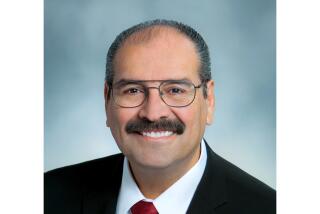Baca’s jails are Baca’s problem
Los Angeles County Sheriff Lee Baca needs to take and keep taking responsibility for the state of the jails he runs. For several months now, he has attempted to shift responsibility for the problems to anyone but himself.
In October, Baca was more outraged by a federal investigation into the jails than the allegations of inmate abuse and deputy misconduct that prompted it. He even went so far as to suggest that the FBI was the real source of troubles in the jails, for its conduct in an investigation there. When he finally backed away from accusing the FBI of misconduct, he blamed his command staff for keeping him in the dark about the scandal, yet refused to discipline anyone for it.
Now, one of the department’s top commanders says he did attempt to warn Baca that deputies were using excessive force against inmates, but was ignored. Robert Olmsted, a retired 32-year veteran, told The Times’ Robert Faturechi and Jack Leonard that he tried to talk to Baca about his concerns twice in 2010 with little success. Olmsted was so troubled by the violence that he ordered an audit of use-of-force reports. He said he also alerted his bosses, but was told that jail culture couldn’t be changed.
It’s no surprise, then, that Baca is now blaming Olmsted for not doing more to address the violence. He didn’t need to “ask for permission to solve the problem,” Baca says. Never mind that a quasi-military organization like the Sheriff’s Department is all about following the chain of command. Or that Baca is trying to have it both ways, suggesting that his command staff failed him by shielding him from the truth, and at the same time blaming Olmsted for not taking care of the problem on his own.
How many times can Baca plead ignorance? This is just the latest in a series of objectionable responses that calls into question whether he is capable of running, let alone reforming, the nation’s largest jail system.
For the public to have confidence that Baca can improve the jails, he must take consistent responsibility for what goes on inside them. This is his crisis, not that of his subordinates. And its resolution will be his legacy, not theirs.
More to Read
A cure for the common opinion
Get thought-provoking perspectives with our weekly newsletter.
You may occasionally receive promotional content from the Los Angeles Times.






